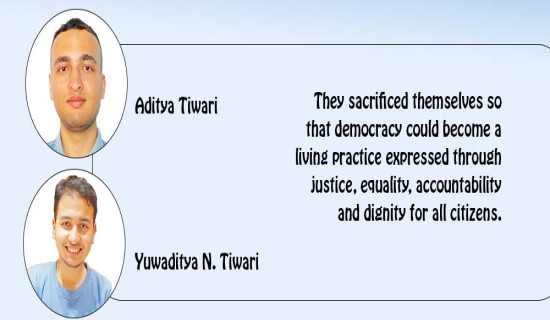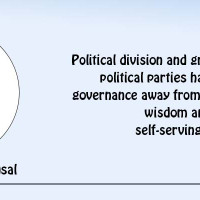- Friday, 30 January 2026
Public-Private Tussle In Education
The government and private school owners are in collision course over the proposed Education Bill, 2080 BS which aims to replace the existing some key provisions of Education Act, 2028 BS. The bill seeks allegedly to regulate the private sector requiring that the profit-oriented privately owned and operated educational institutions be converted into not-for-profit trusts (Guthi) according to the spirit of the federal constitution of Nepal. The fundamental rights of citizens and directive state policies explicitly provide for an expanded state role in the management of such critical social services as health and education.
To follow it up the National Education Commission constituted by the government has recommended that private schools should be facilitated to oblige them to brace for transformation into trust based entities. The provision set forth for amending the Education Act is meted out with stiff resistance by the private school operators and their associations. They contend that private schools have played a pivotal role in the advancement of education system in Nepal, and schools backed by private investment have steadily grown in number.
Growing sentiment
Of particular concern for private schools is a provision in the bill that reportedly requires schools operated by companies to transition into “Guthi” (trust) entities within a five-year timeframe, along with the associated financial liabilities. There is a growing sentiment among stakeholders that the bill may not only discourage private investment but also potentially stifle the growth of the private education sector. Private schools are a visibly ubiquitous phenomenon in urban and rural Nepal. There are certain reasons why private schools are gaining ground in the education landscape of the country.
In fact, teaching-learning environment in government-aided community school is abysmally poor. There are reasons why government-aided schools perform poor to result into exceeding lure of the private schools. Community schools are like a kind of public sector undertakings that tend to suffer losses due to their low productivity and poor ability to respond to market needs and demands.
They have little autonomy as they have to look for the government to recruit teachers to fulfill their teaching positions. The community schools face no competition for survival since they have guaranteed state funding irrespective of any decline in their number of students and poor educational show. Teachers are not very accountable to parents since their remuneration is secure irrespective of whether parents like/patronise them or not.
The teachers in community schools are not very accountable to their management committees too since their salaries are paid into their bank accounts from the government coffers. They are organised into unions along the political lines and are alleged to be affiliated different wings of the political groups for protection. However, in private schools, the situation is different. As the private schools have to rely on the parents for their financial sustenance, they should cater to diverse choices and demands of the parents. Parents have also the room to select a school that can respond to their children’s needs in a close way. Generally, private schools are expected to give parents more ability to choose an environment based on their child’s strengths, interests, learning style or even personality.
Private schools are smaller organisations that can successfully maintain the culture set by the vision of their principal and founding board. That culture is typically the reason why they are distinct and different from others. As a result, they can have a tighter, specific, and unique culture, which can be maintained because they are more compact. Every student chooses to be there, based on the lure of education culture they set and offer.
For example, the students from St. Xavier’s or Budhanilkanth are said to have different outlook, mindset and competence than those of other schools. Since private schools tend to be small, there are fewer levels of bureaucracy to deal with. In addition, parents/guardians are paying for their child to be there, so they rightfully expect to be heard, though the private schools in Nepal are less transparent, arbitrary and lacking any pedagogic vision, generally a good and competently-managed private school is anticipated to provide parents more access to have dialogues with teachers.
Notwithstanding the positive aspects of the private schools, there are several drawbacks that make private schools an issue of public controversy. The most obvious drawback of private schools is that they often come with heavy price tags which are difficult for the ordinary people to finance. Moreover, the private schools give rise to social stratification and differentiation where well off people have an enlarged access and exposure. It is also noticed that private schools render children to go from fit to misfit for a larger social context because of the parochial and insular school environment.
Constitutional vision
On average, private schools pay teachers less and offer fewer benefits than public schools do. These facts substantiate that public and private schools have their both and merits and demerits. Several studies especially done both in Nepal and India establish that private schools have demonstrated better results in terms of value for money but its social and cultural cost is very high. Instead of becoming a social equaliser, duality in the education sector characterised by public and private provisioning has created a greater social divide and inequality.
The Constitution of Nepal has guaranteed right to education to citizens and state has to take greater share of responsibility to deliver education so that every citizen has an equal opportunity to get education. There is a need for the state to expand its role to regulate and manage the education sector to ensure that economically disadvantaged and marginalised groups get quality education to face the competitive world. The government and private schools should sit together to sort out the issues to uphold the constitutional vision of right to education guaranteed to the citizens.
(The author is presently associated with Policy Research Institute (PRI) as a senior research fellow. rijalmukti@gmail.com)

















